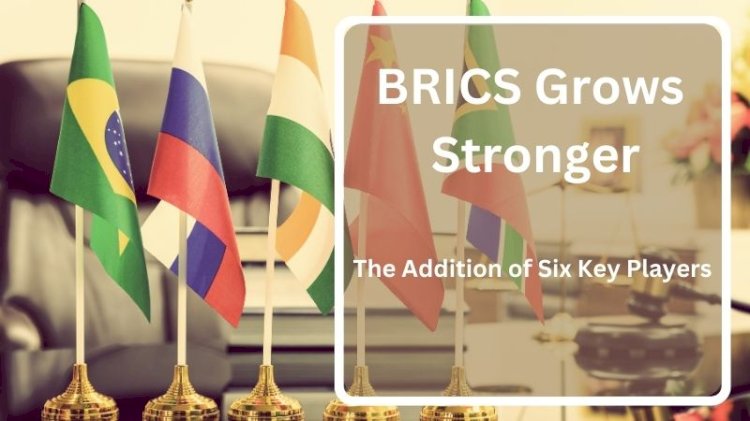BRICS Grows Stronger: The Addition of Six Key Players
In a historic development, BRICS, the alliance of Brazil, Russia, India, China, and South Africa, is set to expand with the addition of Argentina, Iran, UAE, Saudi Arabia, Ethiopia, and Egypt. These new members bring diverse strengths and perspectives, strengthening BRICS' position on the global stage. From economic prowess to strategic importance, these nations enhance the group's influence in various sectors, promising to reshape global diplomacy and cooperation. This expansion marks a pivotal moment in BRICS' history, positioning it as a potent force in international affairs.
By Shreya Rajvanshi Gangal

In a significant development on the global stage, the BRICS group, consisting of Brazil, Russia, India, China, and South Africa, is poised to undergo a remarkable expansion. Six more countries—Argentina, Iran, the United Arab Emirates (UAE), Saudi Arabia, Ethiopia, and Egypt—have officially joined the BRICS alliance, marking a transformative moment in the history of this influential economic and geopolitical consortium. As the world watches with anticipation, this expansion promises to reshape the dynamics of international diplomacy, trade, and cooperation.
Brief Overview of BRICS
The BRICS group emerged in the early 21st century as a powerful coalition of five major emerging economies, each possessing substantial global influence. These nations, Brazil, Russia, India, China, and South Africa, recognized the potential for collaboration on various fronts, such as economic development, political stability, and shared global interests. The BRICS acronym itself reflects the initial letters of each member nation's name.
Over the years, BRICS has evolved from a mere economic alliance into a formidable force on the international stage. It has fostered cooperation on trade, technology, energy, and political matters while actively promoting a multipolar world order. The group has also established its New Development Bank (NDB), which aims to provide an alternative source of funding for infrastructure and sustainable development projects. With its collective economic strength and diplomatic clout, BRICS has challenged the dominance of Western powers, contributing to a more balanced global governance structure.
The Expansion of BRICS: A Game-Changing Move
The inclusion of Argentina, Iran, UAE, Saudi Arabia, Ethiopia, and Egypt into the BRICS bloc is a watershed moment in the group's history. Each of these nations brings unique strengths and perspectives to the table, further enhancing the diversity and reach of BRICS. Here's a glimpse of what these new members bring to the BRICS alliance:
- Argentina: As one of the largest economies in South America, Argentina brings agricultural and natural resource wealth, along with its strong diplomatic ties in the region.
- Iran: A key player in the Middle East, Iran offers a strategic geopolitical advantage and is a significant energy producer, reinforcing BRICS' influence in the energy sector.
- UAE and Saudi Arabia: Both nations are economic powerhouses in the Middle East, with substantial oil reserves. Their inclusion solidifies BRICS' influence in the energy market and strengthens ties in the region.
- Ethiopia: An emerging African powerhouse, Ethiopia adds to BRICS' engagement in Africa, a continent ripe with economic potential. It also contributes to BRICS' commitment to sustainable development.
- Egypt: With its rich history and strategic location in North Africa and the Middle East, Egypt brings diplomatic experience and the potential for strengthening BRICS' presence in the Arab world.
Conclusion
The expansion of BRICS to include Argentina, Iran, UAE, Saudi Arabia, Ethiopia, and Egypt marks a turning point in global geopolitics. This new coalition of nations is poised to create a more diversified and influential alliance that can address pressing global challenges, promote economic growth, and advance multipolar diplomacy. As BRICS continues to evolve, its ability to shape the international order and champion equitable development will be closely watched. The world eagerly anticipates the outcomes of this momentous expansion and the potential it holds for a more balanced and cooperative future.
What's Your Reaction?


















